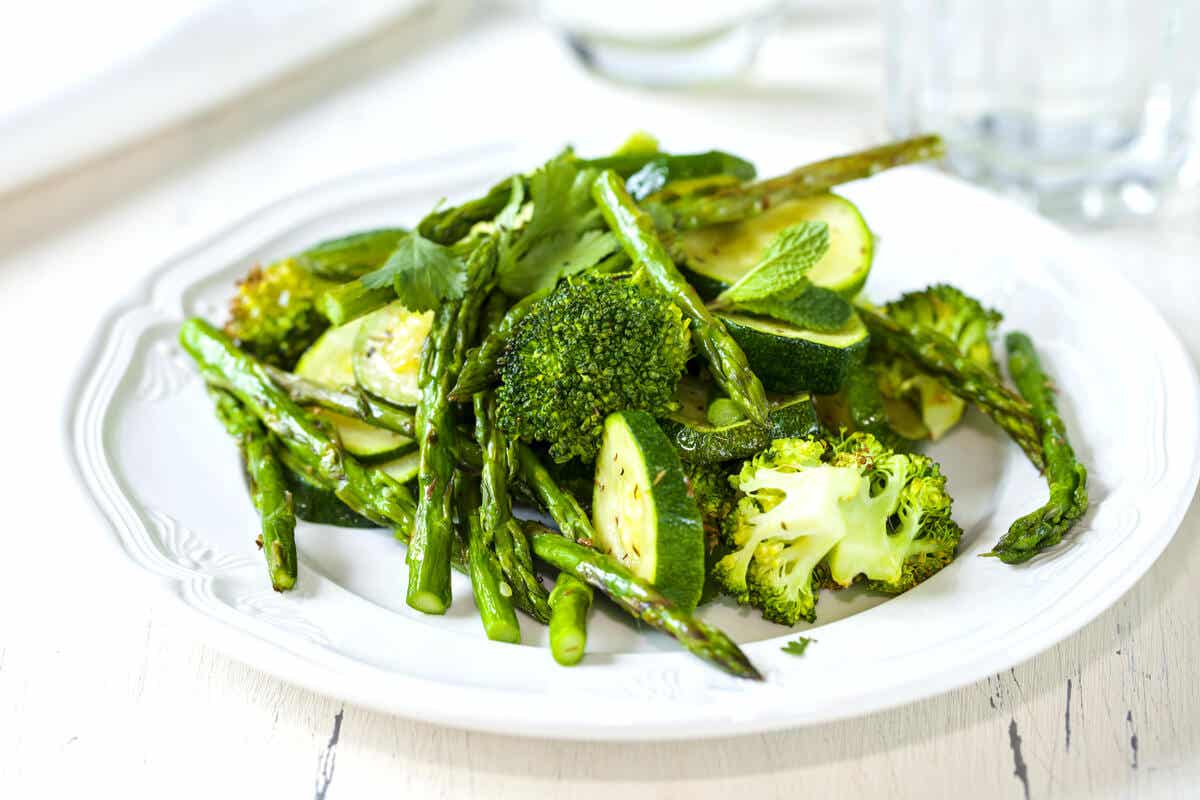The Pros and Cons of the Green Mediterranean Diet


Written and verified by the nutritionist Maria Patricia Pinero Corredor
The Mediterranean diet is one of the healthiest and most popular in the world. Recently, a study published in Heart magazine has shared a new version with more advantages than the traditional one. It’s called the green Mediterranean diet or green med, which improves some health indicators by incorporating more antioxidants and replacing red meat with vegetable proteins.
In particular, it continues to rely on foods like whole grains, fruits, vegetables, legumes, herbs, nuts, and olive oil. However, it has three main components that we will discuss in detail later.
Do you want to learn more about it?
What is the green Mediterranean diet?
The green Mediterranean diet is a more ecological version than the traditional one, since it’s more abundant in green vegetables, and doesn’t include red meat or its derivatives. It was studied in an overweight population. The goal was to verify that eating more polyphenols, and eating less animal protein, positively affects health.
This diet is lower in calories and carbohydrates, but higher in protein. According to Heart magazine, it ranges from 1,500 to 1,800 calories for men and 1,200 to 1,400 calories for women. In total, there were about 40 grams of carbohydrates and 100 grams of protein.
Some authors have pointed out that polyphenols are the main source of antioxidants in green vegetables. For this reason, this diet includes 3 essential components, which are:
- Duckweed or Mankai. According to the journal Clinical Nutrition, it’s a substitute for animal protein. Also, it has polyphenols, vitamin B12, and minerals.
- Green tea. Known for its abundance of polyphenols and other antioxidant substances.
- Nuts. They provide healthy fats, proteins, and antioxidants.

Also read: Low-Calorie Mediterranean Diet: What Should You Keep in Mind?
Foods to eat on the green Mediterranean diet
The distinctive ingredient in the green Mediterranean diet is duckweed or Mankai, in a smoothie, in portions of 100 grams daily. 1 ounce of walnuts and up to 3 cups of green tea a day are also recommended.
Of course, you can substitute duckweed for other sources of plant protein. For example, you could use legumes, soy derivatives like tempeh or tofu, or seeds. In addition, you could try these other options:
- Hummus
- Falafel
- Bean-based pasta
- Lentils
- Quinoa
- Whole wheat pita
- Nutritional yeast
These foods provide healthy fats, antioxidants, dietary fiber, vitamins, and minerals. In its strictest form, it doesn’t include animal proteins. However, those who are a little more flexible can add fish and poultry.
Other foods you can eat are:
- Leafy green vegetables
- Tomatoes
- Purple onions
- Fruits
- Eggs
- Curd
- Yogurt
- Olive oil
- Herbs
- Tahini
- Spices
Advantages of the green Mediterranean diet
A recent study in the journal Heart on the green Mediterranean diet revealed the benefits of this eating model for overall health. In addition, it even suggests that it outweighs the positive effects of the traditional Mediterranean diet.
Specifically, 294 people with moderate obesity participated, which were separated into 3 dietary groups. The first was the control group, who had a healthy diet. There was also a group that followed the traditional Mediterranean diet, and another that followed the green Mediterranean diet. All groups complied with calorie restrictions and exercise.
After 6 months, they evaluated the weight loss, cardiovascular and metabolic risk factors. Participants who followed the green Mediterranean diet lost 12.4 pounds, those who ate the traditional one lost 10.8 pounds and the control group only lost 3 pounds.
The people who followed the green med lost more abdominal fat than those who took the traditional one. A symposium on obesity discusses the relationship between excess abdominal fat and the risk of heart disease, stroke, and type 2 diabetes.
There was a 4% drop in “bad” cholesterol, or LDL, compared to 1% for those on the traditional diet. The control group barely reduced it by 0.2 milligrams/milliliter.
Other cardiovascular and metabolic risk factors improved among those who ate the green Mediterranean diet. A decrease in blood pressure and C-reactive protein was also observed, which is associated with inflammatory disorders.
These results showed a nearly double drop in Framingham’s 10-year risk score. This calculation predicts the likelihood of severe heart disease over the next decade.

Check this out: Eat Five Fruits and Vegetables a Day and Live Longer
Possible downsides
It seems difficult to find any disadvantages of the green Mediterranean diet. Even so, before adopting this type of diet, it’s essential to consider certain aspects. For example, it’s a model that follows an established calorie, carbohydrate, and protein plan that makes it less flexible compared to the traditional Mediterranean diet.
On the other hand, duckweed is a special ingredient that isn’t available everywhere. Because of this, you’ll be eating fewer polyphenols if you substitute it with another vegetable protein source.
Some people tend to substitute the duckweed shake for dinner or one of the main meals. This is another disadvantage, as it tends to affect food preferences and eating style.
Consult a nutritionist
There’s no doubt about the benefits that the green Mediterranean diet offers to promote well-being. Despite this, it’s best to consult a nutritionist before adopting this eating model. They can help you determine how convenient or not it is to follow this type of diet.
Finally, don’t forget that everyone has different nutritional needs based on age, health status, and other factors. So, use your best judgment, no matter how healthy a certain diet may be.
All cited sources were thoroughly reviewed by our team to ensure their quality, reliability, currency, and validity. The bibliography of this article was considered reliable and of academic or scientific accuracy.
- Tsaban G, Yaskolka Meir A, Rinott E, Zelicha H, Kaplan A, Shalev A, Katz A, Rudich A, Tirosh A, Shelef I, Youngster I, Lebovitz S, Israeli N, Shabat M, Brikner D, Pupkin E, Stumvoll M, Thiery J, Ceglarek U, Heiker JT, Körner A, Landgraf K, von Bergen M, Blüher M, Stampfer MJ, Shai I. The effect of green Mediterranean diet on cardiometabolic risk; a randomised controlled trial. Heart. 2020 Nov 23:heartjnl-2020-317802.
- Kaplan A, Zelicha H, Tsaban G, Yaskolka Meir A, Rinott E, Kovsan J, Novack L, Thiery J, Ceglarek U, Burkhardt R, Willenberg A, Tirosh A, Cabantchik I, Stampfer MJ, Shai I. Protein bioavailability of Wolffia globosa duckweed, a novel aquatic plant – A randomized controlled trial. Clin Nutr. 2019 Dec;38(6):2576-2582.
- Budhathoki S, Sawada N, Iwasaki M, Yamaji T, Goto A, Kotemori A, Ishihara J, Takachi R, Charvat H, Mizoue T, Iso H, Tsugane S; Japan Public Health Center–based Prospective Study Group. Association of Animal and Plant Protein Intake With All-Cause and Cause-Specific Mortality in a Japanese Cohort. JAMA Intern Med. 2019 Nov 1;179(11):1509-1518.
- Naghshi S, Sadeghi O, Willett WC, Esmaillzadeh A. Dietary intake of total, animal, and plant proteins and risk of all cause, cardiovascular, and cancer mortality: systematic review and dose-response meta-analysis of prospective cohort studies. BMJ. 2020 Jul 22;370:m2412.
- Quiñones1, M. Miguel2 y A. Aleixandre. Los polifenoles, compuestos de origen natural con efectos saludables sobre el sistema cardiovascular. Nutr Hosp. 2012;27(1):76-89. Disponible en: https://scielo.isciii.es/pdf/nh/v27n1/09_revision_08.pdf.
- Bryce Moncloa A, Alegría Valdivia E, San Martín MG. Obesidad y riesgo cardiovascular. An Fac med. 2017;78(2):202-206.
This text is provided for informational purposes only and does not replace consultation with a professional. If in doubt, consult your specialist.








